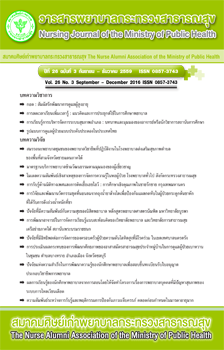ปัจจัยที่มีความสัมพันธ์กับความสุขของนิสิตพยาบาล หลักสูตรพยาบาลศาสตร์บัณฑิต มหาวิทยาลัยบูรพา; Factors Related to Happiness of Undergraduate Nursing Students; Faculty of Nursing; Burapha University
Main Article Content
Abstract
การศึกษาครั้งนี้เป็นการวิจัยเชิงบรรยายแบบหาความสัมพันธ์ มีวัตถุประสงค์เพื่อหาความสัมพันธ์ระหว่างปัจจัยคัดสรร ได้แก่ การเห็นคุณค่าในตนเอง ความฉลาดทางอารมณ์ สัมพันธ์ภาพกับเพื่อน สัมพันธภาพภายในครอบครัว สัมพันธภาพกับอาจารย์ และการสนับสนุนทางสังคมกับความสุขของนิสิตคณะพยาบาลศาสตร์มหาวิทยาลัยบูรพา ชั้นปีที่ 2, 3, และ 4 จำนวน 444 ราย เครื่องมือที่ใช้การการเก็บรวบรวมข้อมูล คือ แบบสอบถามข้อมูลส่วนบุคคล แบบสอบถามการเห็นคุณค่าในตนเอง แบบประเมินความฉลาดทางอารมณ์ แบบสอบถามสัมพันธภาพกับเพื่อน ครอบครัว อาจารย์ แบบสอบถามการสนับสนุนทางสังคม และแบบสอบถามดัชนีชี้วัดความสุขคนไทย มีค่าความเชื่อมั่นเท่ากับ .77, .94, .72, .93, .70, .89 และ .88 ตามลำดับ วิเคราะห์ข้อมูลโดยใช้สถิติเชิงพรรณนา และสหสัมพันธ์ของเพียร์สัน
ผลการศึกษาพบว่า
1. นิสิตชั้นปีที่ 2, 3, และ4 มีระดับคะแนนเฉลี่ยความสุขไม่แตกต่างกัน โดยมี นิสิตชั้นปีที่ 2 และ 3 มีระดับคะแนนเฉลี่ยความสุขใกล้เคียงกัน และนิสิตชั้นปีที่ 4 มีระดับคะแนนเฉลี่ยความสุขมากที่สุด และ มากกว่าครึ่ง (52.5%) ของนิสิตทั้งหมด มีระดับคะแนนเฉลี่ยความสุขมากกว่าคนทั่วไป และ 41 คน (9.2%) มีระดับคะแนนเฉลี่ยความสุขน้อยกว่าคนทั่วไป
2. การเห็นคุณค่าในตนเอง ความฉลาดทางอารมณ์ สัมพันธ์ภาพกับเพื่อน สัมพันธภาพภายในครอบครัว สัมพันธภาพกับอาจารย์ และการสนับสนุนทางสังคมมีความสัมพันธ์ทางบวกอย่างมีนัยสำคัญทางสถิติที่ระดับ .01และระดับปานกลางกับความสุข
ผลการวิจัยจะเป็นข้อมูลพื้นฐานที่สำคัญให้กับสถาบันการศึกษาพยาบาล นำเป็นแนวทางในการกำหนดนโยบาย ในการเสริมสร้างความสุขให้แก่กลุ่มนิสิตพยาบาล โดยเฉพาะกลุ่มที่มีระดับความสุขต่ำกว่าปกติ เพื่อป้องกันปัญหาด้านสุขภาพจิตและจิตเวชต่อไป
Factors Related to Happiness of Undergraduate Nursing Students,
Faculty of Nursing, Burapha University
Pichamon Poonnotok*
Chanudda Napkasorn*
Abstract
This descriptive correlational research aimed to examine the relationships between self-esteem; emotional quotient; relationship with friends, family, and teachers; social support; and happiness of nursing students at the Faculty of Nursing, Burapha University. The sample was composed of 444 nursing students in Years 2, 3, and 4. The instruments included demographic data, self-esteem scale, emotional quotient questionnaire, friend relationship survey form, family relationship survey form, teacher relationship survey form, social support scale, and the Thai Mental Health Indicator. These questionnaires had reliabilities of 0.77, 0.94, 0.72, 0.93, 0.70, 089, and 0.88, respectively. Descriptive statistics and Pearson’s correlation was used for data analyses.
The results of the study were as follows:
1. The nursing students in different years had no statistical differences in the mean scores of happiness, Though the second and the third year students showed similar mean scores of happiness, while fourth year students showed the highest mean happiness score. More than a half of them (52.5%) showed a high mean happiness score and forty one of them (9.2%) showed a low mean happiness score.
2. Self-esteem, emotional quotient, relationship with friends, with family, with teachers; and social support, had a moderate positive significant relationships with happiness (p< .01).
The study findings can be used as a basic knowledge for nursing educational institutions to develop policies and guidelines to increase happiness of the nursing students especially in those who show lower mean happiness scores, to prevent future mental health problems.
Article Details
บทความและรายงานวิจัยในวารสารพยาบาลกระทรวงสาธารณสุข เป็นความคิดเห็นของ ผู้เขียน มิใช่ของคณะผู้จัดทำ และมิใช่ความรับผิดชอบของสมาคมศิษย์เก่าพยาบาลกระทรวงสาธารณสุข ซึ่งสามารถนำไปอ้างอิงได้

